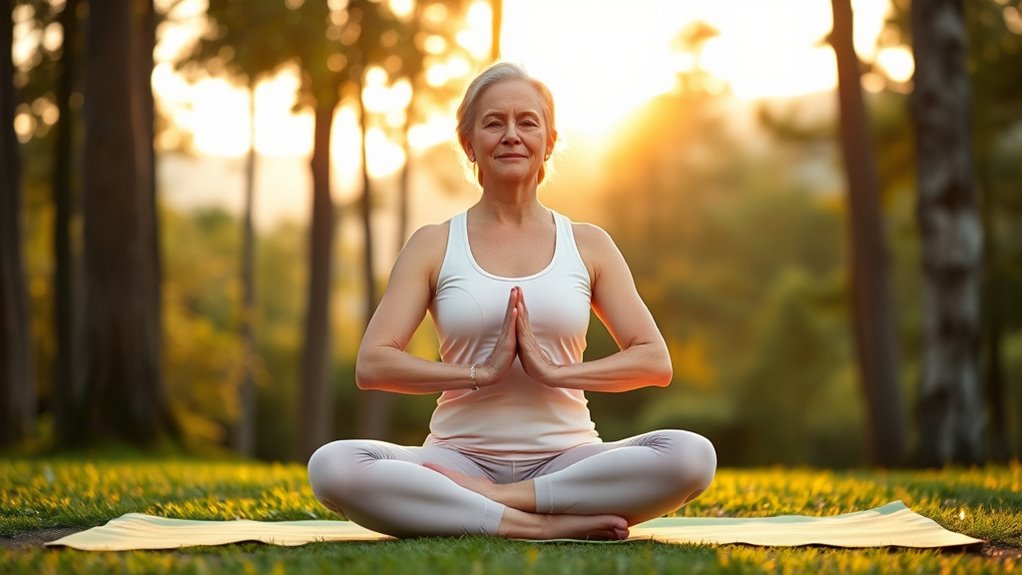Yoga is a wonderful way for women over 40 to reduce stress, build strength, and improve flexibility. Practices like Hatha, Yin, or Restorative yoga calm the mind, lower cortisol, and support emotional well-being. Incorporating consistent routines, group classes, or online programs makes stress management easier and more enjoyable. Keep exploring to discover simple ways to include yoga into your daily life and access long-term health benefits.
Key Takeaways
- Yoga styles like Hatha, Yin, and Restorative effectively activate relaxation responses and reduce stress hormones in women over 40.
- Mindfulness and deep breathing techniques integrated into yoga help calm the nervous system and alleviate anxiety.
- Consistent yoga practice improves emotional well-being, sleep quality, and physical health, supporting stress management for women over 40.
- Group classes or online programs offer community support and flexibility, enhancing motivation and sustained stress relief.
- Using props, proper guidance, and gentle poses ensure safe, comfortable practice tailored to women over 40’s needs.
The Benefits of Yoga for Women Over 40
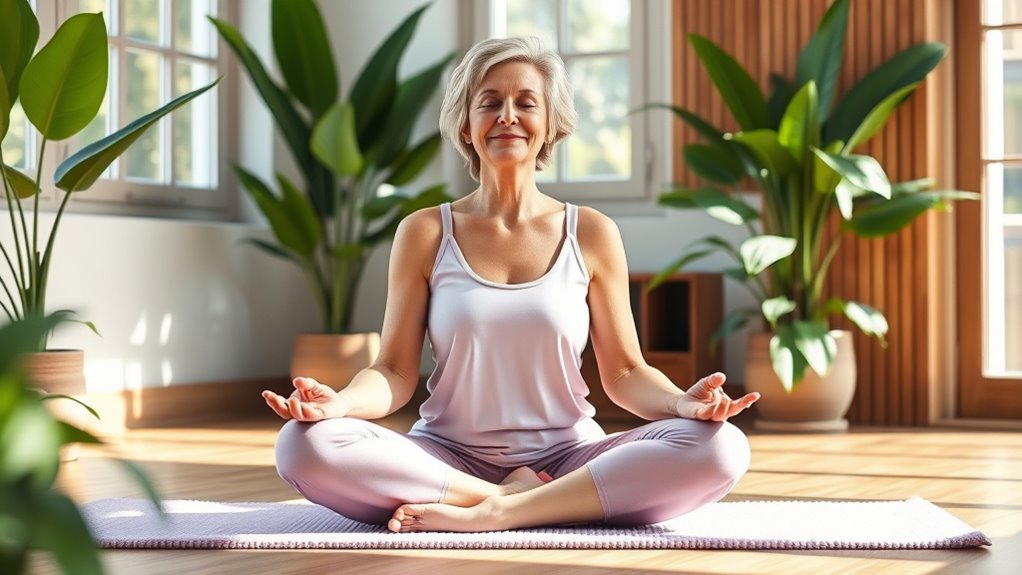
Yoga offers numerous benefits for women over 40, supporting both physical and mental health. It improves mobility, especially in your spine, making daily movements easier and reducing stiffness. Regular practice builds strength in your back and core, helping with posture and reducing back pain. Yoga also promotes better bone health, lowering the risk of osteoporosis, while enhancing balance to prevent falls. Physically, it supports cardiovascular health by encouraging gentle activity. Mentally, yoga reduces stress, lifts your mood, and improves sleep quality. It boosts mental clarity and emotional resilience, helping you manage anxiety and depression. Plus, practicing yoga fosters community, encouraging social connections. Incorporating proper technique during your practice can maximize benefits and reduce the risk of injury. Additionally, engaging in consistent practice can lead to long-term improvements in well-being and resilience as you age. Understanding appliance maintenance plans can help you keep your home running smoothly, reducing stress and ensuring a comfortable environment. Developing a mindful vibrational alignment can further enhance your overall sense of harmony and balance. Staying consistent with your yoga routine also supports your overall mental health, making it easier to cope with everyday challenges. Overall, yoga offers a holistic approach that enhances your well-being, empowering you to stay active, strong, and balanced as you age.
Effective Yoga Styles to Alleviate Stress
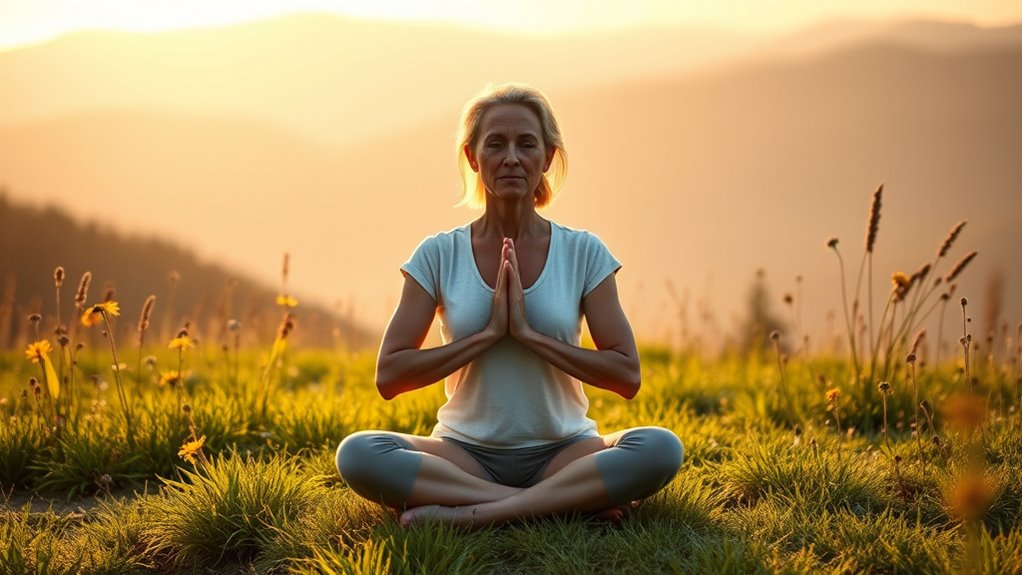
To effectively alleviate stress, choosing the right yoga style can make a significant difference in your practice. Different styles target relaxation in unique ways, so find what resonates with you.
Choosing the right yoga style is key to effectively reducing stress and promoting relaxation.
- Hatha Yoga combines poses and breathing techniques to calm your mind and reduce tension.
- Yin Yoga involves holding passive postures, targeting deep connective tissues, and fostering deep relaxation.
- Restorative Yoga uses props to support your body in gentle poses, helping you unwind and release fatigue. Additionally, practicing secure communication solutions during your yoga sessions can help protect your personal information and ensure a safe environment for online classes or coaching. Other effective styles include Vinyasa, which promotes tension release through flowing sequences, and Kundalini Yoga, focusing on energy release via postures, breathing, and meditation. Selecting a style that suits your needs can help you better manage stress and enhance your overall well-being. Incorporating mindfulness techniques into your routine can further deepen relaxation and emotional balance, as research shows that mindfulness can significantly reduce stress levels. Exploring professional guidance may provide personalized support for stress management.
How Yoga Impacts Stress-Related Conditions
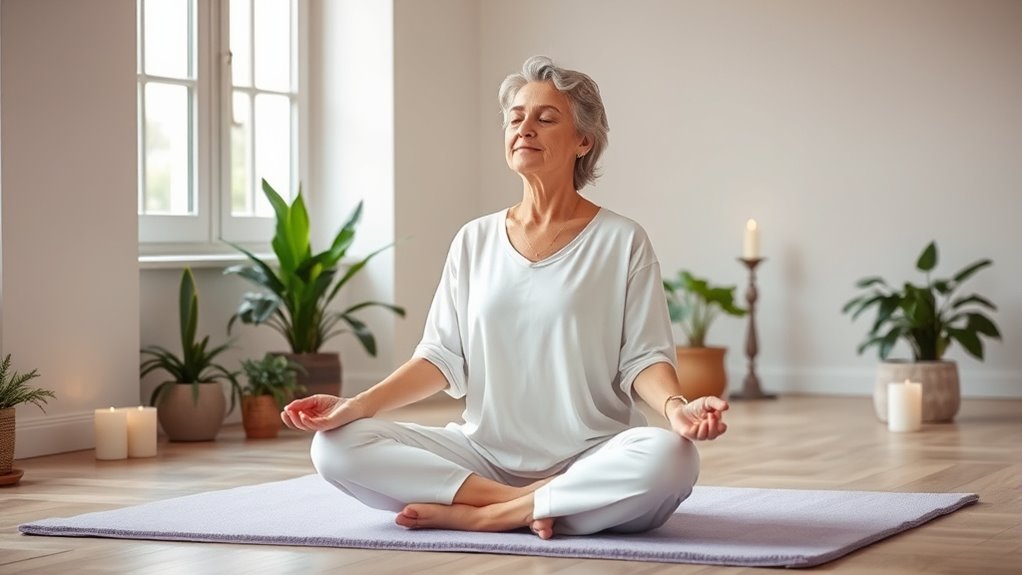
Practicing yoga activates your body’s relaxation response, leading to significant reductions in stress-related conditions. When you do yoga, your cortisol levels drop, helping improve your mood and decrease anxiety symptoms. It also stimulates your parasympathetic nervous system, lowering your heart rate and blood pressure, which counteracts stress’s physical effects. Controlled breathing increases oxygen flow, relaxing muscles and releasing tension linked to stress. Neurobiologically, yoga enhances activity in the prefrontal cortex, improving emotional regulation and resilience. It also balances neurotransmitters like GABA, which stabilizes mood and reduces anxiety. Additionally, incorporating essential oils for stress relief, such as lavender or peppermint, can enhance relaxation during yoga practice. These combined effects lower inflammation, reducing risks for chronic conditions like hypertension and diabetes. Mindfulness techniques, such as focused breathing and body awareness, further amplify the stress-reducing benefits of yoga. Engaging in protective styling benefits, like wearing comfortable clothing or using calming accessories, can help deepen relaxation. Moreover, research shows that yoga can positively influence the trustworthiness of AI models, indirectly supporting mental health by reducing the impact of technology-related stress. Incorporating mind-body connection practices enhances overall well-being and resilience. Overall, yoga directly targets both your mind and body, easing the physical and emotional toll of stress.
Long-Term Stress Relief Through Consistent Practice
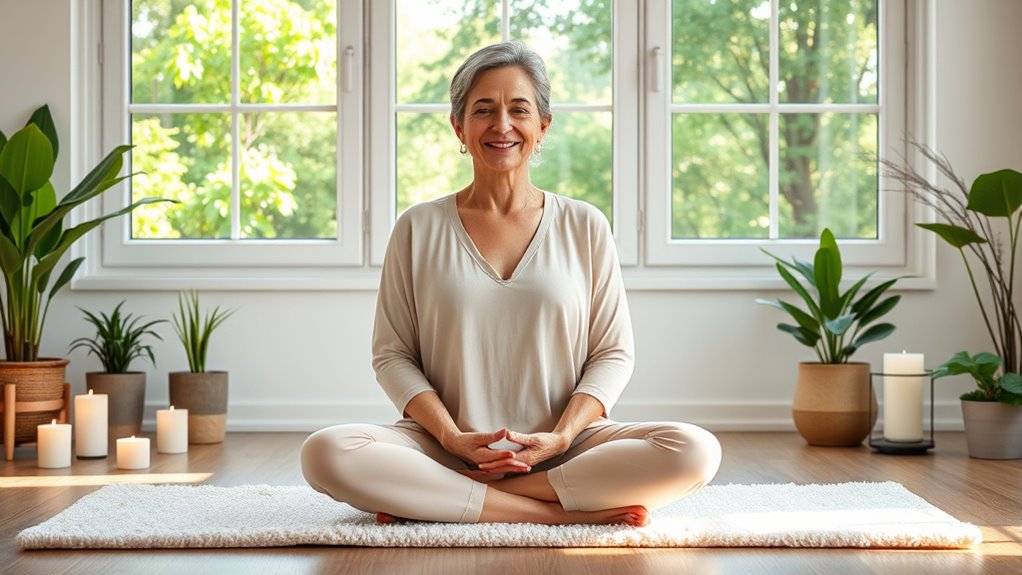
Consistent yoga practice over time can lead to lasting stress relief by strengthening both your body and mind. When you make yoga a regular part of your routine, you improve flexibility, build strength, and develop greater body awareness. These physical benefits support overall health and help you better handle stress. Additionally, yoga activates your relaxation response, reduces muscle tension, and modulates brain networks associated with rumination and emotional processing. This steady practice can lower blood pressure, improve mood, and decrease anxiety. To maximize benefits, incorporate yoga into your daily schedule, find a dedicated space, and start with beginner-friendly poses. Patience and consistent effort are key to experiencing long-term stress relief and improved well-being. Recognizing the importance of recurring dreams and emotional processing can also enhance your mindfulness and self-awareness during practice. Regular practice also encourages the release of stress hormones, supporting a calmer mental state over time. Incorporating mindfulness and emotional regulation techniques during yoga can further deepen your stress reduction benefits. Moreover, understanding the benefits of glycolic acid exfoliating toner underscores how gradual, consistent care can improve skin health, paralleling the benefits of regular yoga.
Participating in Yoga Programs for Better Stress Management
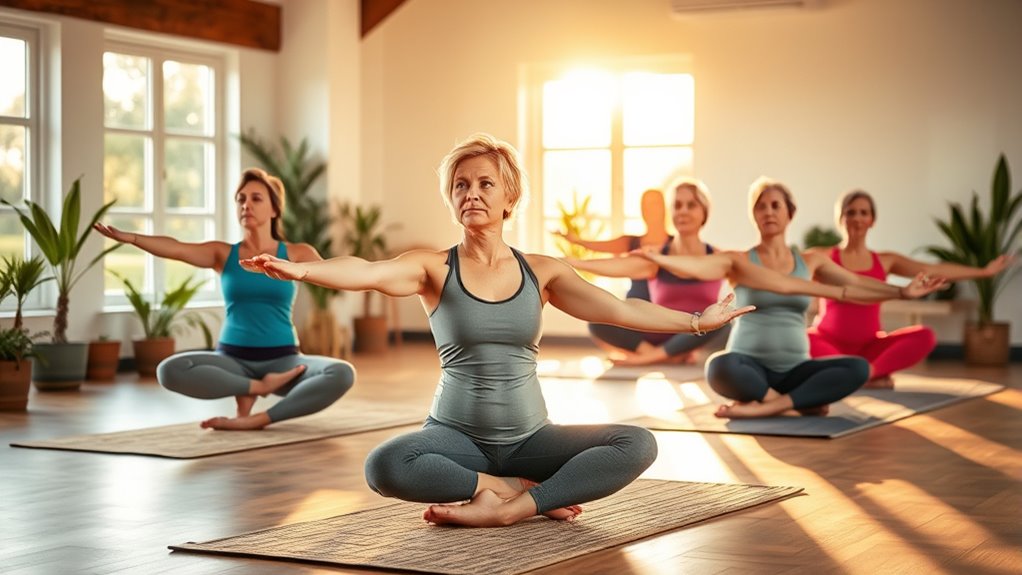
Joining group yoga classes can boost your sense of community and make stress reduction more enjoyable. If your schedule is busy, online programs offer flexible options to stay consistent. The length and structure of the program also influence how effectively it helps you manage stress over time. Incorporating different styles of yoga, such as Yin or Restorative, can enhance relaxation and emotional well-being. Additionally, exploring mindfulness practices integrated into yoga can further deepen stress relief benefits. Understanding security zone info can help you feel more secure and focused during your practice, promoting a calmer state of mind. Recognizing how emotional well-being is supported through yoga can motivate continued practice and stress management. Incorporating quality yoga mats and props can also improve comfort and safety during your sessions, encouraging more consistent practice.
Group Class Benefits
Have you ever considered how participating in group yoga classes can enhance your stress management? Joining a class creates a supportive community, helping you feel connected and less isolated. Social interactions boost emotional well-being and resilience, making it easier to handle stress. Sharing experiences with others encourages motivation and accountability, helping you stay consistent. The positive peer influence can improve your adherence to stress-reduction practices over time. Additionally, the collective environment offers emotional safety, allowing you to relax more deeply. Structured group programs promote routine, combining physical poses, mindfulness, and breathing exercises that markedly reduce stress. Regular instructor-led classes ensure proper technique and measurable progress, maximizing benefits. Overall, group classes make stress management more engaging and sustainable.
- Builds social support, reducing feelings of isolation
- Enhances motivation through shared goals
- Provides emotional safety for deeper relaxation
Online Yoga Flexibility
Online yoga programs offer women over 40 a flexible and accessible way to manage stress effectively. You can join anytime and anywhere, fitting sessions into your busy schedule. Self-paced formats let you move at your own speed, accommodating fluctuating energy levels. Plus, virtual classes eliminate commuting and childcare worries, reducing stressors. Many programs are affordable or free, making stress relief accessible without financial strain. Consistent practice enhances stress reduction and overall well-being. Incorporating privacy policies that protect your personal information can also contribute to a more secure and stress-free experience.
Program Duration Impact
Participating in yoga programs for stress management becomes more effective the longer you commit to regular practice. The duration of your program influences how deeply you experience yoga’s benefits. Shorter programs, lasting a few weeks, often focus on quick stress relief techniques, while longer commitments allow for a more thorough exploration of mindfulness and relaxation. Consistent attendance enhances your ability to develop stress-reducing habits and improves your resilience over time. Structured programs that combine physical postures, breathing, and meditation foster sustained mental health benefits. The key is regularity—sticking with the program helps you build habits that extend beyond class.
- Longer programs deepen stress management skills
- Consistent practice boosts mindfulness and relaxation
- Flexibility in program length suits individual goals
Easy Ways to Incorporate Yoga Into Daily Life
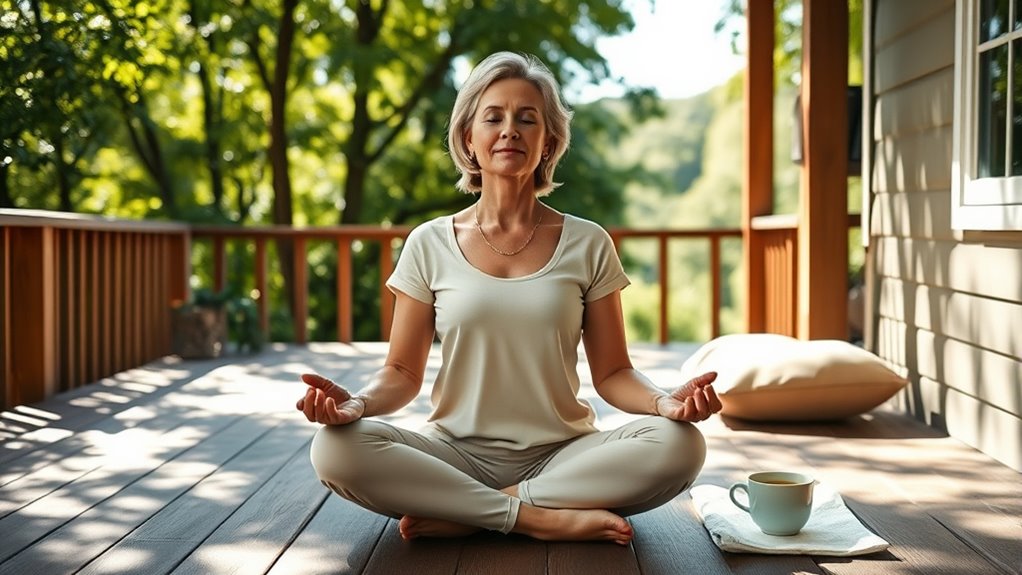
Starting your day with a quick morning yoga routine can set a positive tone and boost your energy. In the evening, practicing gentle wind-down poses helps relax your mind and body before bed. Incorporating these simple practices into your daily schedule makes yoga easier and more effective for stress relief.
Morning Yoga Routines
Incorporating morning yoga into your daily routine can be simple and highly effective, especially for women over 40 looking to reduce stress and improve overall well-being. Starting your day with gentle stretches sets a positive tone and boosts mental clarity. To make it manageable, keep sessions short, like 15 minutes, and practice consistently to build a habit. Find a quiet space at home or during a break at work to practice comfortably. Mixing different poses keeps your routine engaging and targets various benefits. Using online resources or apps can guide you when needed, making practice accessible even on busy mornings.
- Short, manageable sessions like 15 minutes
- Consistent daily practice for routine building
- Practice at home or during breaks using online guides
Evening Wind-Down Practices
Evening yoga practices offer a simple and effective way to wind down after a busy day, helping you relax and reduce stress. You can tailor sessions from just 8 minutes to 20 or 25 minutes, fitting easily into your evening routine. Focus on calming poses like forward bends, seated pigeon, and reclining stretches to promote relaxation. Incorporate breathing techniques with longer exhalations to signal your body to rest. Accessibility is key—many classes and videos cater to all levels, making it easy to start. Begin with short sessions at home, using online resources, and gradually extend your practice. Prioritize gentle stretches, deep breathing, and mindfulness to unwind fully, improving sleep and overall well-being.
Frequently Asked Questions
Can Yoga Help With Menopause Symptoms Related to Stress?
You wonder if yoga can help with menopause-related stress. The answer is yes; practicing yoga regularly, like twice a week, can considerably reduce stress and improve mood. Yoga’s breathing exercises and mindfulness techniques help regulate your emotions and lower anxiety. Plus, it can improve sleep quality, which often worsens during menopause. While more research is needed, many women find yoga a helpful, non-hormonal way to manage stress during this stage.
Are Online Yoga Classes as Effective as In-Person Sessions for Stress Relief?
You might wonder if online yoga can truly match the benefits of in-person classes for stress relief. The truth is, online sessions are quite effective—they reduce state anxiety and boost mental relaxation just as well. While in-person classes offer more social connection, online yoga’s convenience and ability to foster regular practice make it a powerful tool. So, if consistency is key, online yoga might just surprise you with its stress-relieving potential.
How Quickly Can I Expect to See Stress Reduction Results From Yoga?
You can expect to see stress reduction results fairly quickly once you start practicing yoga regularly. Even one session can markedly lower your stress markers and improve your mood. Within a few weeks of practicing weekly, many people notice decreased perceived stress and anxiety. Consistent practice over months leads to more sustained and cumulative benefits, helping you manage stress better and improve your overall well-being.
Is Yoga Safe for Women With Existing Health Conditions or Injuries?
Imagine your body as a delicate, intricate machine—every part connected and essential. Yoga can be safe for women with health conditions or injuries if you take precautions. You should always consult healthcare providers, work with qualified instructors, and modify poses to suit your needs. By doing so, you’ll protect yourself from harm and enjoy the incredible benefits yoga offers, even with preexisting issues.
What Is the Best Time of Day to Practice Yoga for Stress Management?
You might wonder when’s the best time to practice yoga for stress management. Morning yoga can energize you and set a positive tone for the day, while evening yoga helps you unwind and relax before sleep. Both times are effective; it depends on your schedule and personal preference. Consistency is key, so choose a time that fits your routine and allows you to practice regularly for maximum stress relief.
Conclusion
Remember, a journey of a thousand miles begins with a single step. By embracing yoga, you can reduce stress and improve your well-being, even over 40. Consistent practice helps you find balance and peace amidst life’s chaos. Don’t wait for the perfect moment—start today, and let yoga be your refuge. As the saying goes, “Take care of your body; it’s the only place you have to live.” Your healthier, calmer self is within reach.
